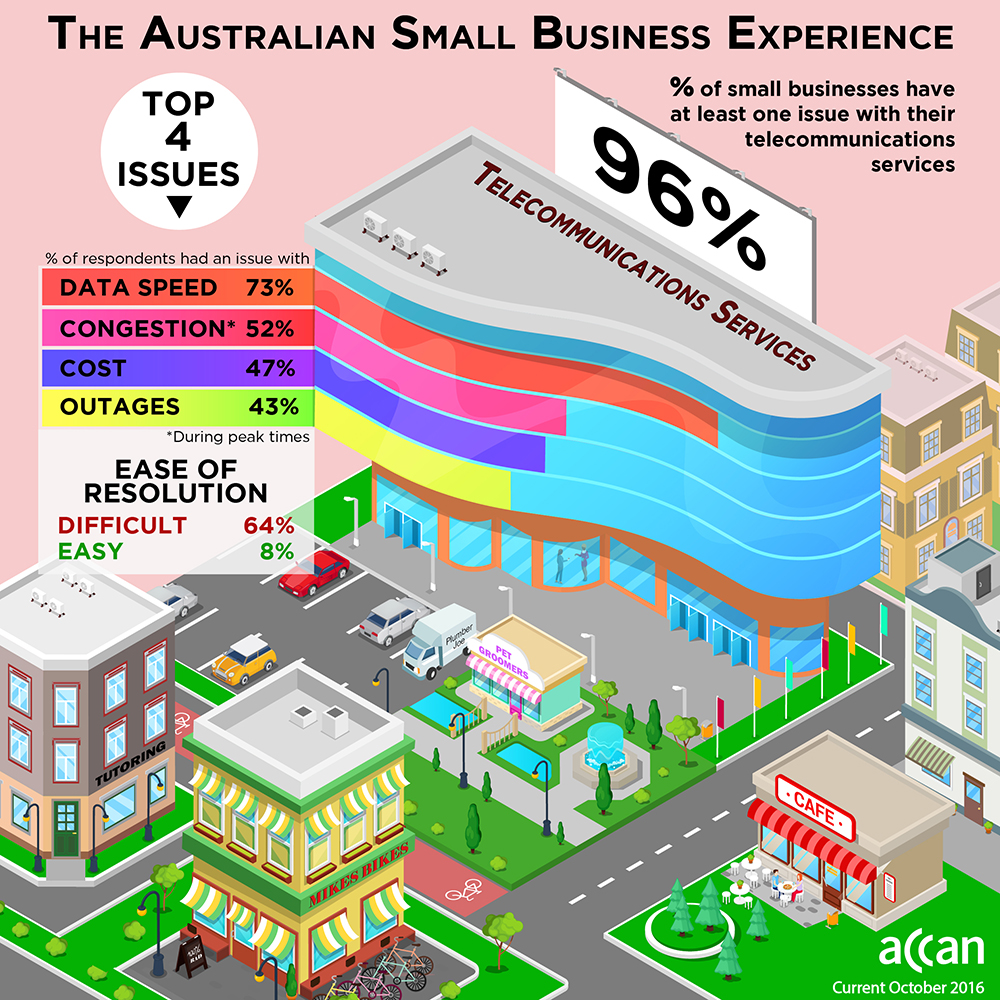Australian small businesses provide employment for around 4.8 million people. As most small businesses rely on telecommunications services to be able to do business, it is essential these services be available, reliable and affordable. When a small business cannot access a broadband connection or make phone calls, business proceses can become difficult. When a small business operator waits in a call centre queue or is transferred between different customer service representatives trying to have a fault resolved, they are not only losing time, but money. This impact on productivity and turnover affects not only the small business owner, but its employees and customers.
ACCAN has produced guides that will provide small business consumers with the tools to assist them to:
- Understand their rights as a phone and internet consumer
- Be aware of the important features of telecommunications services and products to help them to choose products that best suit their business needs.
- Understand available complaint mechanisms
- Learn ways to get the most out of communications services they rely on
Research Reports:
- Informing Small Business: Examining fixed phone and broadband products
- Small Business Telecommunications Service Use and Experience
ACCAN recently submitted our response to the Australian Communications and Media Authority’s (ACMA) Review of the Numbering Plan and other instruments discussion paper. Telephone numbering is a fundamental aspect of our communications infrastructure, providing consumers and small businesses with mechanisms to recognise and be recognised through calls and texts.
Read more: Review of the Numbering Plan and other instruments discussion paper
ACCAN recently submitted to the inquiry into the shutdown of the 3G mobile network and telecommunications services accessibility.
Funding of universal telecommunications services (RBS Review)
ACCAN recently commented on the Department of Infrastructure, Transport, Regional Development, Communications and the Arts’ consultation on the Funding of universal telecommunications services (RBS Review). The funding of the universal service obligation (USO) is integral to ensuring the efficacy and longevity of Australia’s communications services, especially for those who are living in regional, rural and remote areas, have specific accessibility needs, or are living on a low income.
Read more: Funding of universal telecommunications services (RBS Review)
ACCAN recently submitted to the Australian Communications and Media Authority (ACMA)’s consultation paper on Expiring spectrum licences (stage 2) – information gathering, and views on uses of frequency bands and alternative licence conditions (the Consultation Paper).
ACCAN supports the ACMA’s finalised expiring spectrum licence (ESL) stage 2 information gathering framework and its public interest criteria (PIC) as outlined in the Consultation Paper.
ACCAN recommends that the ACMA:
ACCAN recently submitted to the inquiry into regional telecommunications in Western Australia, focusing on mobile telecommunications failure during widespread power outages.
ACCAN recently submitted to the Senate Select Committee on Adopting Artificial Intelligence (AI).
ACCAN considers that the consumer sector requires greater support to engage with AI and other emerging technologies that will impact consumers. At present there is no consumer group funded to engage with AI and emerging technologies on behalf of consumers. As AI and other emerging technologies become embedded in our societies and markets there are growing risks of harms.
ACCAN recently submitted to the Australian Communications and Media Authority’s (ACMA) consultation on its Five-year spectrum outlook 2024–29 and 2024–25 work program Consultation Paper. Our submission:
- Supports the ACMA’s public interest criteria with respect to spectrum planning and allocation.
- Encourages the ACMA to explore the adoption of shorter-term flexible spectrum licences.
- Supports the ACMA giving further consideration towards ensuring that their engagement strategies fully capture consumer experiences as end users of spectrum.
- Supports the introduction of a reply comment period for future spectrum consultations.
ACCAN recently submitted to the NSW Fair Trading Strategy and Regulatory Priorities Discussion Paper (the Discussion Paper).
ACCAN supports the proposed strategic direction as outlined in the Discussion Paper. ACCAN considers that NSW Fair Trading should take into account the connectivity issues faced by communications consumers living in strata/renting when deciding its future strategy and regulatory priorities.
ACCAN recently submitted to the Department of Infrastructure, Transport, Regional Development, Communications and the Arts on the draft Ministerial Policy Statement — Expiring Spectrum Licences (the Draft).
Read more: Draft Ministerial Policy Statement — Expiring Spectrum Licences
ACCAN recently submitted to Communications Alliance’s consultation on the review of the G596:2013 Communications Support for Emergency Response Industry Guideline (the Guideline).
The Guideline provides a procedure that facilitates cooperation between Pre-planned Service Providers, Secondary Service Providers, and Emergency Services Organisations in circumstances where pre-planned services are inadequate, and ad-hoc additional communications supports are requested by an Emergency Services Organisation.
Read more: G596:2013 Communications Support for Emergency Response Industry Guideline
ACCAN recently submitted to the Australian Competition and Consumer Commission’s (ACCC) Digital Platform Services Inquiry – September 2024 report revisiting general search services issues paper.

